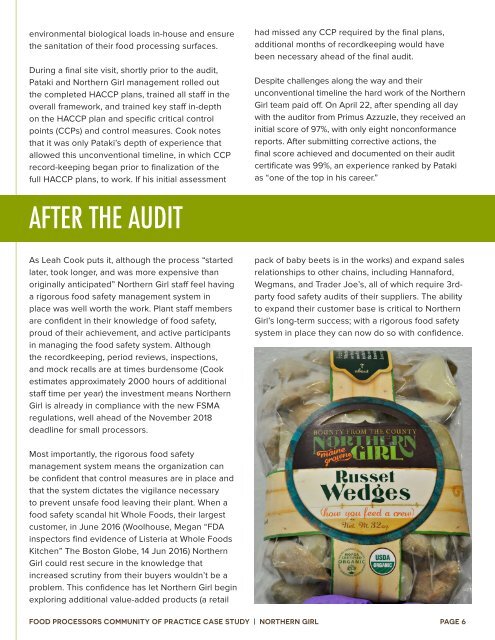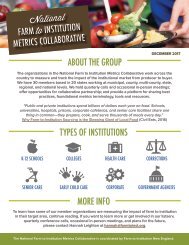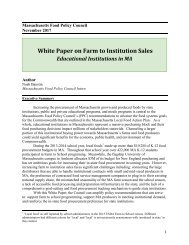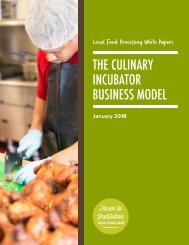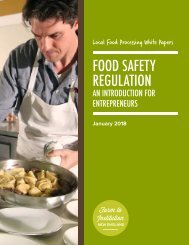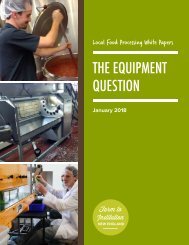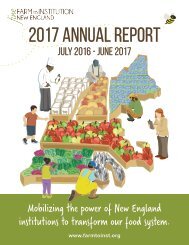Northern Girl Case Study
You also want an ePaper? Increase the reach of your titles
YUMPU automatically turns print PDFs into web optimized ePapers that Google loves.
environmental biological loads in-house and ensure<br />
the sanitation of their food processing surfaces.<br />
During a final site visit, shortly prior to the audit,<br />
Pataki and <strong>Northern</strong> <strong>Girl</strong> management rolled out<br />
the completed HACCP plans, trained all staff in the<br />
overall framework, and trained key staff in-depth<br />
on the HACCP plan and specific critical control<br />
points (CCPs) and control measures. Cook notes<br />
that it was only Pataki’s depth of experience that<br />
allowed this unconventional timeline, in which CCP<br />
record-keeping began prior to finalization of the<br />
full HACCP plans, to work. If his initial assessment<br />
had missed any CCP required by the final plans,<br />
additional months of recordkeeping would have<br />
been necessary ahead of the final audit.<br />
Despite challenges along the way and their<br />
unconventional timeline the hard work of the <strong>Northern</strong><br />
<strong>Girl</strong> team paid off. On April 22, after spending all day<br />
with the auditor from Primus Azzuzle, they received an<br />
initial score of 97%, with only eight nonconformance<br />
reports. After submitting corrective actions, the<br />
final score achieved and documented on their audit<br />
certificate was 99%, an experience ranked by Pataki<br />
as “one of the top in his career.”<br />
AFTER THE AUDIT<br />
As Leah Cook puts it, although the process “started<br />
later, took longer, and was more expensive than<br />
originally anticipated” <strong>Northern</strong> <strong>Girl</strong> staff feel having<br />
a rigorous food safety management system in<br />
place was well worth the work. Plant staff members<br />
are confident in their knowledge of food safety,<br />
proud of their achievement, and active participants<br />
in managing the food safety system. Although<br />
the recordkeeping, period reviews, inspections,<br />
and mock recalls are at times burdensome (Cook<br />
estimates approximately 2000 hours of additional<br />
staff time per year) the investment means <strong>Northern</strong><br />
<strong>Girl</strong> is already in compliance with the new FSMA<br />
regulations, well ahead of the November 2018<br />
deadline for small processors.<br />
pack of baby beets is in the works) and expand sales<br />
relationships to other chains, including Hannaford,<br />
Wegmans, and Trader Joe’s, all of which require 3rdparty<br />
food safety audits of their suppliers. The ability<br />
to expand their customer base is critical to <strong>Northern</strong><br />
<strong>Girl</strong>’s long-term success; with a rigorous food safety<br />
system in place they can now do so with confidence.<br />
Most importantly, the rigorous food safety<br />
management system means the organization can<br />
be confident that control measures are in place and<br />
that the system dictates the vigilance necessary<br />
to prevent unsafe food leaving their plant. When a<br />
food safety scandal hit Whole Foods, their largest<br />
customer, in June 2016 (Woolhouse, Megan “FDA<br />
inspectors find evidence of Listeria at Whole Foods<br />
Kitchen” The Boston Globe, 14 Jun 2016) <strong>Northern</strong><br />
<strong>Girl</strong> could rest secure in the knowledge that<br />
increased scrutiny from their buyers wouldn’t be a<br />
problem. This confidence has let <strong>Northern</strong> <strong>Girl</strong> begin<br />
exploring additional value-added products (a retail<br />
FOOD PROCESSORS COMMUNITY OF PRACTICE CASE STUDY | NORTHERN GIRL PAGE 6


